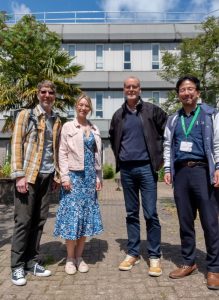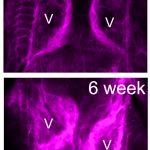BU’s team of Drosophila scientists were delighted to host a visit from Dr Tony Cammarato, Associate Professor at Johns Hopkins University School of Medicine. Tony (a visiting fellow at BU) met and gave a fantastic talk to colleagues and undergraduates, detailing work spanning three decades that has defined how heart muscle cells (cardiomyocytes) regulate force during contraction.

(L to R) Dr Tony Cammarato, Ms Jess Whalley, Dr Paul Hartley, Dr Yutaka Matsubayashi
By identifying the specific amino acids that control how muscle troponin proteins interact with the cell’s contractile myosin and actin ‘scaffold’ his research group is explaining how cardiomyopathies develop in humans. The work, which consistently features in the field’s leading journals, is highly significant not only for its rigour and ingenuity but also because it is laying the foundation for medical interventions that correct the cardiomyopathies.
It is well worth noting that this research relies heavily on genetically defined Fruit flies (Drosophila melanogaster), a very powerful and tractable tool with which to model the molecular mechanisms underpinning human cardiomyocyte function.
At BU we use Drosophila to model the effects of ageing, metabolism and environmental pollutants on heart and kidney function. It has become very clear that insect and human cardiovascular systems are affected in the same way by the same problems. So, by working with scientists such as Tony, we can develop experimental approaches that generate findings of relevance to many species, including humans.
 Molecular basis for a healthier heart…new work published by BU
Molecular basis for a healthier heart…new work published by BU










 REF Code of Practice consultation is open!
REF Code of Practice consultation is open! BU Leads AI-Driven Work Package in EU Horizon SUSHEAS Project
BU Leads AI-Driven Work Package in EU Horizon SUSHEAS Project Evidence Synthesis Centre open at Kathmandu University
Evidence Synthesis Centre open at Kathmandu University Expand Your Impact: Collaboration and Networking Workshops for Researchers
Expand Your Impact: Collaboration and Networking Workshops for Researchers ECR Funding Open Call: Research Culture & Community Grant – Apply now
ECR Funding Open Call: Research Culture & Community Grant – Apply now ECR Funding Open Call: Research Culture & Community Grant – Application Deadline Friday 12 December
ECR Funding Open Call: Research Culture & Community Grant – Application Deadline Friday 12 December MSCA Postdoctoral Fellowships 2025 Call
MSCA Postdoctoral Fellowships 2025 Call ERC Advanced Grant 2025 Webinar
ERC Advanced Grant 2025 Webinar Update on UKRO services
Update on UKRO services European research project exploring use of ‘virtual twins’ to better manage metabolic associated fatty liver disease
European research project exploring use of ‘virtual twins’ to better manage metabolic associated fatty liver disease